Lerone Bennett dies at 89; historian, journalist, writer chronicled black history
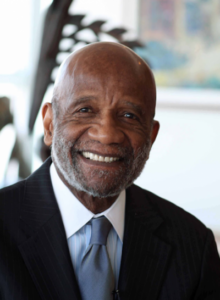
Lerone Bennett Jr.
Lerone Bennett Jr., who wrote influential books on African-American history and resilience and chronicled key events in the civil rights movement as a journalist and top editor at Ebony magazine, has died at 89 in Chicago.
He had vascular dementia, according to Ebony, where he worked for approximately half a century.
Among his books are “Before the Mayflower: A History of Black America” and “The Shaping of Black America.” They have been reprinted multiple times and translated into many languages. And they were treasured in countless African-American homes. (more)
28 Days, 28 Films for Black History Month
New York Times film critics have chosen essential movies from the 20th century that convey the larger history of black Americans in cinema
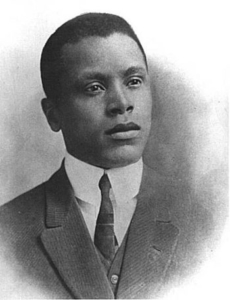
Oscar Micheaux was a novelist and bold, prolific independent filmmaker. Micheaux along with black directors like Spencer Williams made “race movies,” low-budget films with all-black casts for black audiences.
It has been almost a year since Barry Jenkins’s “Moonlight” won the Oscar for best picture. This awards season, Jordan Peele’s “Get Out” and Dee Rees’s “Mudbound” have received multiple nominations and accolades, optimistic signs that black filmmakers are receiving more opportunities in the movie industry. Soon these titles will be joined by two of the most anticipated releases of the year: Ryan Coogler’s “Black Panther,” the first Marvel superhero movie from a black director, and Ava DuVernay’s “A Wrinkle in Time,” the first movie with a $100 million budget directed by a black woman.
The critical and box-office success of “Get Out” and the very existence of big-studio productions like “Black Panther” are good reasons to revisit the remarkable, complex story of black filmmaking in America. For Black History Month, we have selected 28 essential films from the 20th century pertaining to African-American experiences. These aren’t the 28 essential black-themed films, but a calendar of suggested viewing. We imposed a chronological cutoff in an effort to look back at where we were and how we got to here. (more)
Austin’s history built on legacy of African-American families
 In 1839, Austin was chosen to be the new capital of the Republic of Texas.
In 1839, Austin was chosen to be the new capital of the Republic of Texas.
What you may not know is according to the Austin History Center, more than 100 slaves were brought in to construct the first buildings here, so the government of the Republic would have a place to stay.
Much of Austin’s history is built on the legacy of African-Americans families who – known and unknown – helped make it what it is today.
Inside the Austin History Museum Downtown, ordinary moments – frozen in time – help tell the story of African-Americans in and around the capital city. (more)
TIPHC Bookshelf
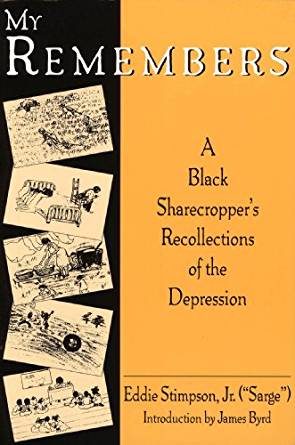 Published scholarship on black history in Texas is growing and we’d like to share with you some suggested readings, both current and past, from some of the preeminent history scholars in Texas and beyond. We invite you to take a look at our bookshelf page – including a featured selection – and check back as the list grows. A different selection will be featured each week. We welcome suggestions and reviews. This week, we offer, “My Remembers, A Black Sharecropper’s Recollections of the Depression,” By Eddie Stimpson Jr.
Published scholarship on black history in Texas is growing and we’d like to share with you some suggested readings, both current and past, from some of the preeminent history scholars in Texas and beyond. We invite you to take a look at our bookshelf page – including a featured selection – and check back as the list grows. A different selection will be featured each week. We welcome suggestions and reviews. This week, we offer, “My Remembers, A Black Sharecropper’s Recollections of the Depression,” By Eddie Stimpson Jr.
“I grow up a dirt farmer and retired a dirt farmer. Never got rich and didn’t want to be. My childhood stomping ground is now concrete, stores and houses. I remember the good times and bad. It was not the money we made but how to stretch that last dime. It was not the wind, rain or snow. It was about the love that flow. It was not the hot sunshine nor the clouds that hung low. It was the grace of God that help us swang that hoe. I want my grandchildren to understand. My grands, your grands and their grands.”
In 1929, near Plano, Texas, Eddie Stimpson, Jr., weighing 15-1/2 pounds, was born to a 19-year-old father and a 15-year-old mother. The boy, his two sisters and mother all “grew up together,” with the father sharecropping along the old Preston Road, the route used by many freedmen trying to escape Texas after the Civil War.
His childhood was void of luxuries, but full of country pleasures. The editors have retained the simplicity of Stimpson’s folk speech and spelling patterns, allowing the good-natured humility and wisdom of his personality to shine through the narrative. “Tough time never last,” he writes, “but tough people all way do.”
The details of ordinary family life and community survival include descriptions of cooking, farming, gambling, visiting, playing, doctoring, hunting, bootlegging, and picking cotton, as well as going to school, to church, to funerals, to weddings, to Juneteenth celebrations.
This book will be of extraordinary value to folklorists, historians, sociologists, and anyone enjoying a good story.
“My spelling is bad, my hand writing is bad, and my language is bad,” Stimpson writes. “But my remembers is still in tack.”
This Week in Texas Black History
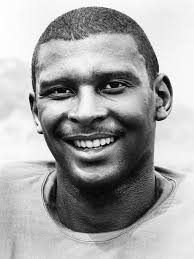
Homer Jones
Feb18
On this day in 1941 sprinter and football player Homer Jones was born in Pittsburg, Tx. Jones attended Texas Southern University and participated in both track and football. He was a member of the 1962 U.S. Track team and clocked 9.4 seconds in the 100-yard dash, .02 behind the great Bob Hayes. Jones was drafted by the Houston Oilers in 1963 but was cut during training camp because of a knee injury, however, he was picked up by the New York Giants. He had a brief, seven-year career, but in 1967 caught 49 passes for 1,209 yards, averaging 24.7 yards per catch, and 13 touchdowns, leading the NFL in receiving touchdowns. For his career, Jones averaged 22.3 yards per catch, leading all receivers with more than 200 receptions.
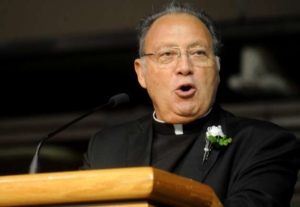
Curtis J. Guillory
Feb19
Most Reverend Curtis J. Guillory became the first black Catholic bishop in Texas on this day in 1988. Guillory, a native of Mallet, Louisiana, was installed as auxiliary bishop of the Catholic Diocese of Galveston-Houston. He became the fifth bishop of the 34-year-old Beaumont Diocese on July 28, 2000 and the first African-American to be bishop of Beaumont – or ordinary of any diocese in Texas, for that matter. His father’s side of the family has been traced back to France. His mother’s side of the family has been traced to the Isle Dominica in the West Indies. He is the oldest of 16 children (six sons, ten daughters).
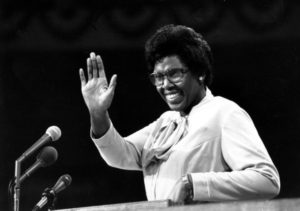
Barbara Jordan
Feb21
On this day in 1936, Congressman Barbara Jordan was born in Houston. A graduate of Phillis Wheatley High School, Jordan was elected to the U.S. House of Representatives from the Eighteenth Texas District in 1973, becoming the first Black woman from a Southern state to serve in Congress. Jordan received the Presidential Medal of Freedom in 1994, and held the Lyndon Baines Johnson Public Service Professorship at the LBJ School of Public Affairs, University of Texas at Austin.
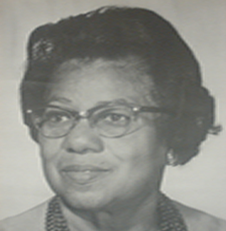
Dolores Burton Linton
Feb21
Dolores Burton Linton, educator, was born on this day in 1910 in Seguin. In 1931, Linton converted a former dance hall to hold classes for black children living near San Antonio, but lacking transportation to regularly get to the city to attend school. Linton taught all six grades herself. In 1980, the Northside Independent School District named a new elementary school in her honor.

David “Fathead” Newman
Feb24
On this day in 1933, jazz saxophonist David “Fathead” Newman was born in Corsicana. Newman grew up in Dallas, graduating from Lincoln High School, then studying theology and music at Jarvis Christian College. For 12 years, beginning in 1954, he was a member of the Ray Charles Band and became the group’s lead tenor soloist. He also played with Herbie Mann, Aretha Franklin, Hank Crawford, Aaron Neville, and Austin’s Kenny Dorham. In 2005, Newman’s album, “I Remember Brother Ray,” was the most played jazz album in the nation.
Blog: Ron Goodwin, Ph.D., author, PVAMU history professor
Ron Goodwin’s bi-weekly blog appears exclusively for TIPHC. Goodwin is a San Antonio native and Air Force veteran. Generally, his column addresses contemporary issues in the black community and how they relate to black history. He and the TIPHC staff welcome your comments.
Latest Entries
A New Hope
Forgive me for borrowing the title of one of the most profitable films in history, “Star Wars: A New Hope.” I’ve always been enamored by space. I’m a child of the 1960s and I remember playing with my Major Matt Mason action figure (not a doll!) as my family [...]
Tell me the truth
Democracy – a) government by the people, b) a government in which the supreme power is vested in the people and exercised by them, directly or indirectly through a system of representation usually involving periodically held free elections. Merriam-Webster Dictionary There were many things I learned from my father. [...]
Submissions Wanted
Historians, scholars, students, lend us your…writings. Help us produce the most comprehensive documentation ever undertaken for the African American experience in Texas. We encourage you to contribute items about people, places, events, issues, politics/legislation, sports, entertainment, religion, etc., as general entries or essays. Our documentation is wide-ranging and diverse, and you may research and write about the subject of your interest or, to start, please consult our list of suggested biographical entries and see submission guidelines. However, all topics must be approved by TIPHC editors before beginning your research/writing.
We welcome your questions or comments. Please contact Mr. Michael Hurd, Director of TIPHC, at mdhurd@pvamu.edu.
